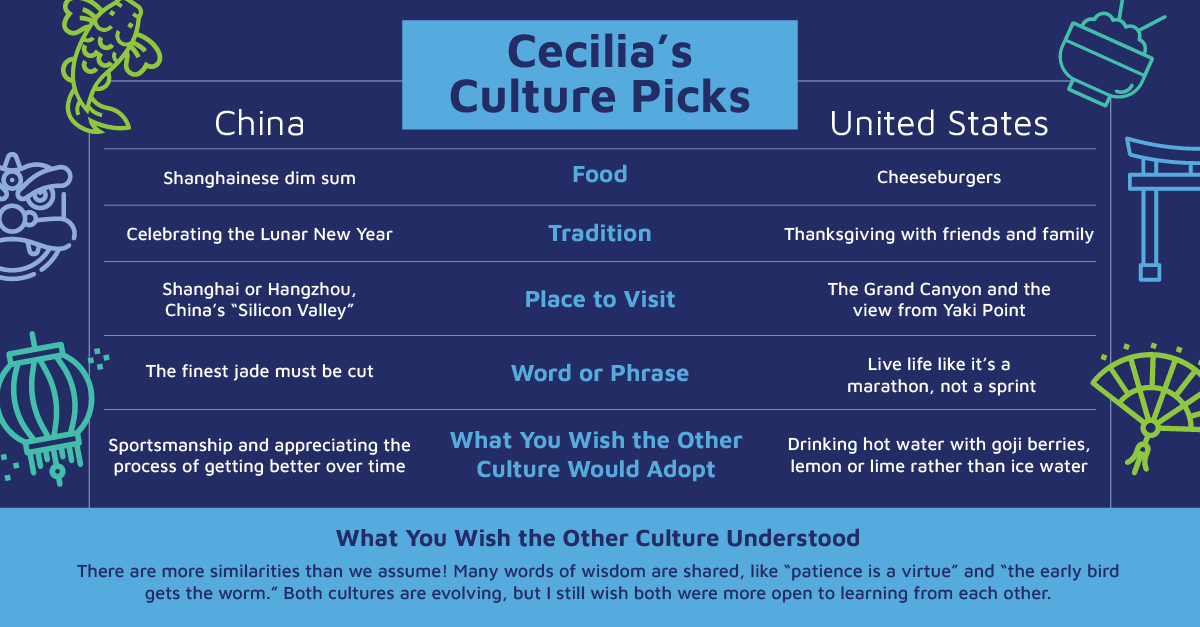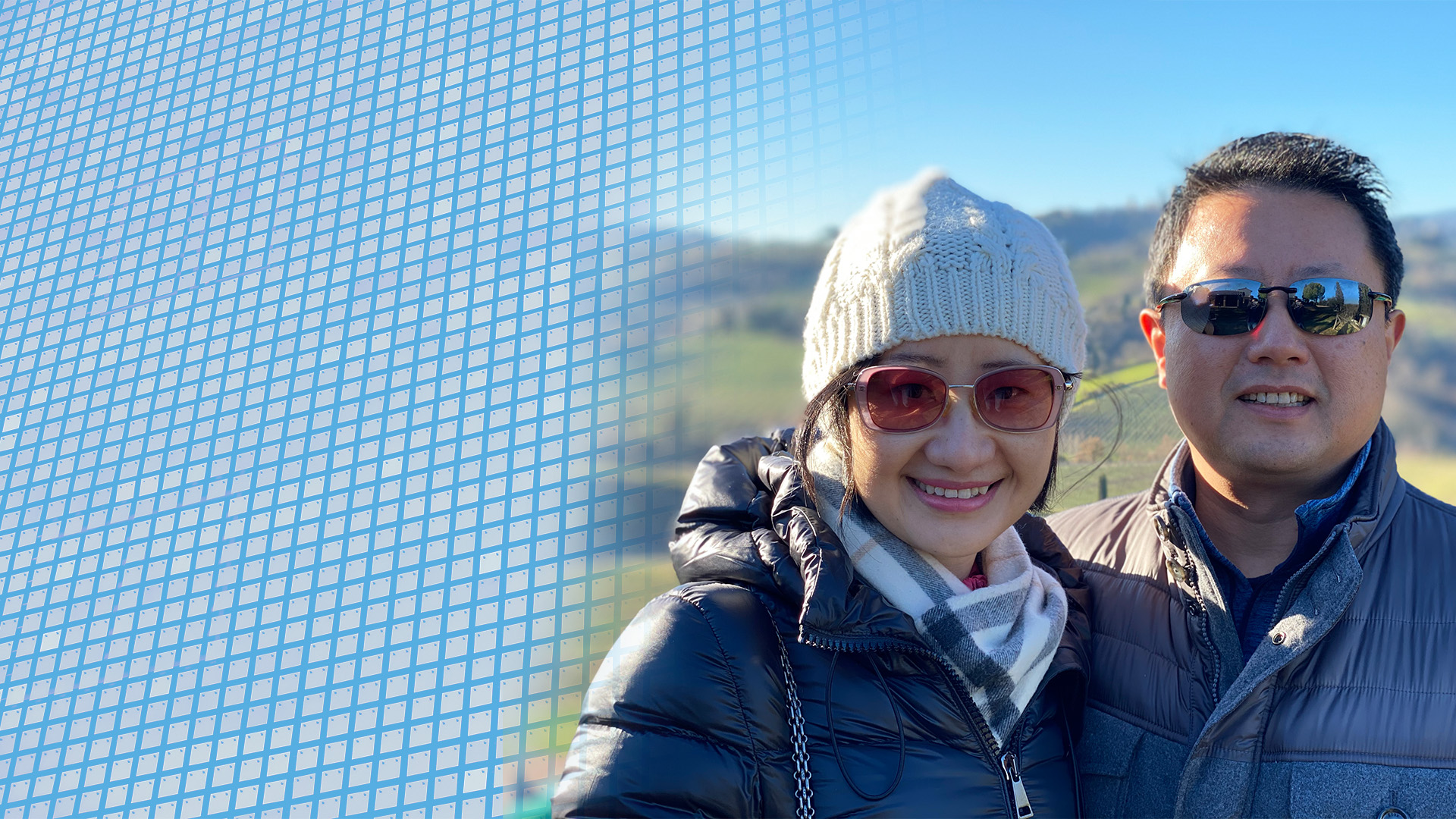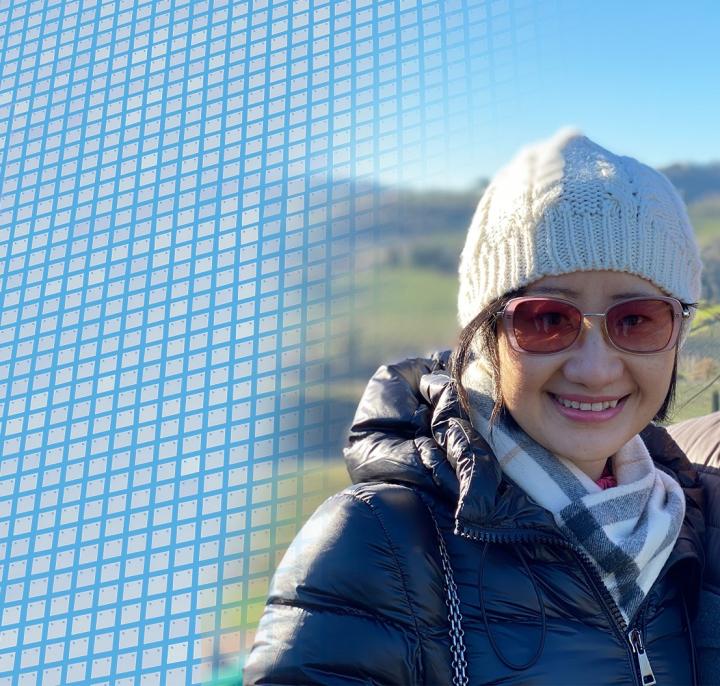"The U.S. has always been an immigration-centric country, and even though the American composition is still majority Caucasian, the color of the nation is very different now. Coming from a different cultural background gives me great perspective in thinking about how we can serve the nation as an ethnicity."
How we can serve the nation, indeed. After moving to the U.S. from China 20 years ago, Cecilia Wu’s career in developing insights has been honed at some of the country’s largest companies—Sam’s Club, Walmart and now Walgreens Boots Alliance—thanks to her knack for applying internal and external perspectives to consumer psychology. Most recently, she has been supporting the leadership team of both Walgreens and WBA’s U.S. Healthcare segment with insights to better serve health consumers across the country.
She has a deep passion for consumer behavior and analytics. It’s one that inspired her to move to the U.S. to build on her undergraduate studies with a master’s degree. It’s also a passion that has helped her to navigate living in a different country with a complex language and unfamiliar culture. She was born and raised in Shanghai, China, where much of her family still lives today.
"Shanghai will always have a special place in my heart, even though very soon the U.S. will surpass Shanghai as the place where I’ve spent most of my adult life," says Wu.
Wu grew up in the bustling, dense city that’s considered China’s economic center (it’s the third most populous city in the world and has the world’s busiest port) with her sister and parents. After studying English as a foreign language in middle school, she went on to obtain a degree in management information systems before moving to the U.S. to earn her MBA at the University of Illinois, Urbana-Champaign. Even though, in her mid-20s, she had mastered the English language, the many quirks and colloquialisms thrown about by native speakers rendered her too shy to be as talkative and open as she’d hoped to be. But Wu was motivated by the challenge and used her observational skills to learn American culture and grow into her confidence.
"I always try to understand the root cause behind cultural differences, which goes back to my obsession about consumer psychology and history," says Wu. "I think knowing the history of how culture was developed gives me an appreciation for it, and I overall feel more empowered by the dual cultural background I now have, rather than challenged by it."
Launching a career in consumer insights and analytics
It was her resilience and committed focus that inspired her to remain in the U.S. despite her original plans to return home—not to mention, she had a job offer in strategic planning and analytics at a transportation company. Eventually, she would shift to customer insights and analytics for Sam’s Club and then Walmart before joining WBA in 2020.
As the vice president of global insights and analytics for WBA, she provides insights to support crucial decision-making across retail, pharmacy and, most recently, U.S. Healthcare. They examine behavioral, attitudinal and cultural trends of core customers, whether it’s inflationary changes in shopping habits or prescription pick-up trends over time. The results her team generates can change the trajectory of how WBA’s global retail pharmacy business operates.
"The purpose of my team has always been anchored in amplifying the voice of the customer, so we have a bias toward action," she said. Of her team, Wu explains, "We need to be the headlights of the organization, meaning we need to bring forward-looking insights. For example, we have found that by 2065, there will be no ethnic majority in the US. That means Walgreens needs to put inclusivity and DEI at the heart of everything we do—internally and externally—and leverage personalization to meet consumer needs.
As a healthcare company, harnessing data will enable consumers to understand their health credentials and enable us to address concerns more personally."
Celebrating Chinese culture at home
Wu’s action-driven approach also informs the way she raises her American-born, 15-year-old son, whose life has been influenced by elements of both Chinese and American cultures. Wu and her husband, who was also born in Shanghai, speak Mandarin at home, and she reinforces the language by teaching her son Mandarin one-on-one.
"It's kind of hard, but I find it’s a good bonding time for us," says Wu. "It pays off now that he's in his teenage years."
Through this exposure, Wu says her son has developed more of an interest in Chinese pop culture, which has been another avenue of learning and way for him to connect to his relatives abroad.
"I see the benefit of having a Chinese background, and I love the fact that I’m Chinese, but I also love the fact that I’m American now," she says.
She notes that since she has moved, she has seen the two cultures fuse beyond her own experience. She’s even seen it in something as simple as the evolution of American menus, and how she can eat a power bowl with salmon, chickpeas and bok choy for lunch—a favorite of hers—that combines elements of American, Chinese and Mediterranean cuisines.
Finding a community at WBA
Wu has watched as the two countries have begun to share more and more cultural interests, from fashion trends to the rise of TikTok. Watching the cultures evolve—a change that has not been without its issues—has come up in her work with the WBA's AsianConnect BRG.
"I find that sharing different perspectives is very powerful," says Wu, a frequent speaker at the BRG’s events and panels. "It allows me a way to share my story and help our community process what's happening in the nation. In my opinion, ‘minority’ is not a term that just covers ethnicity anymore. It’s more about the mindset shift. We have a lot of freedom to express our thinking around some of the social topics of today. The spectrum of the different backgrounds of this country helps me appreciate the dynamic."
Regarding the increase in Asian-targeted hate crimes since COVID-19, she recognizes the increasing need to feel empowered in her identity and with others who can relate to the pain of facing unwarranted hate.
"The presence of AsianConnect is a great way of recognizing there's this group within WBA and people who can be reached out to. And the social events, whether people getting together for food or for cultural events, they give us a sense of belonging and sense of togetherness."
Having the opportunity to connect with WBA colleagues is important to Wu and meaningful to the workplace culture of a global company. If there is one thing she has learned since moving to the U.S. that has served her well, it’s to be confident in that your lived experience earns you a right to speak your mind.
"I’m only 5’2 and pretty petite," she says. "So that’s one thing my mentor taught me: Be louder in a meeting room and don’t be a flower on the wall. Voice your opinion. You have a reason to be there."

Explore Themes in this Article
Explore Topics in this Article
-
我们的故事 更多公司故事和视频,随时了解沃博联动态







